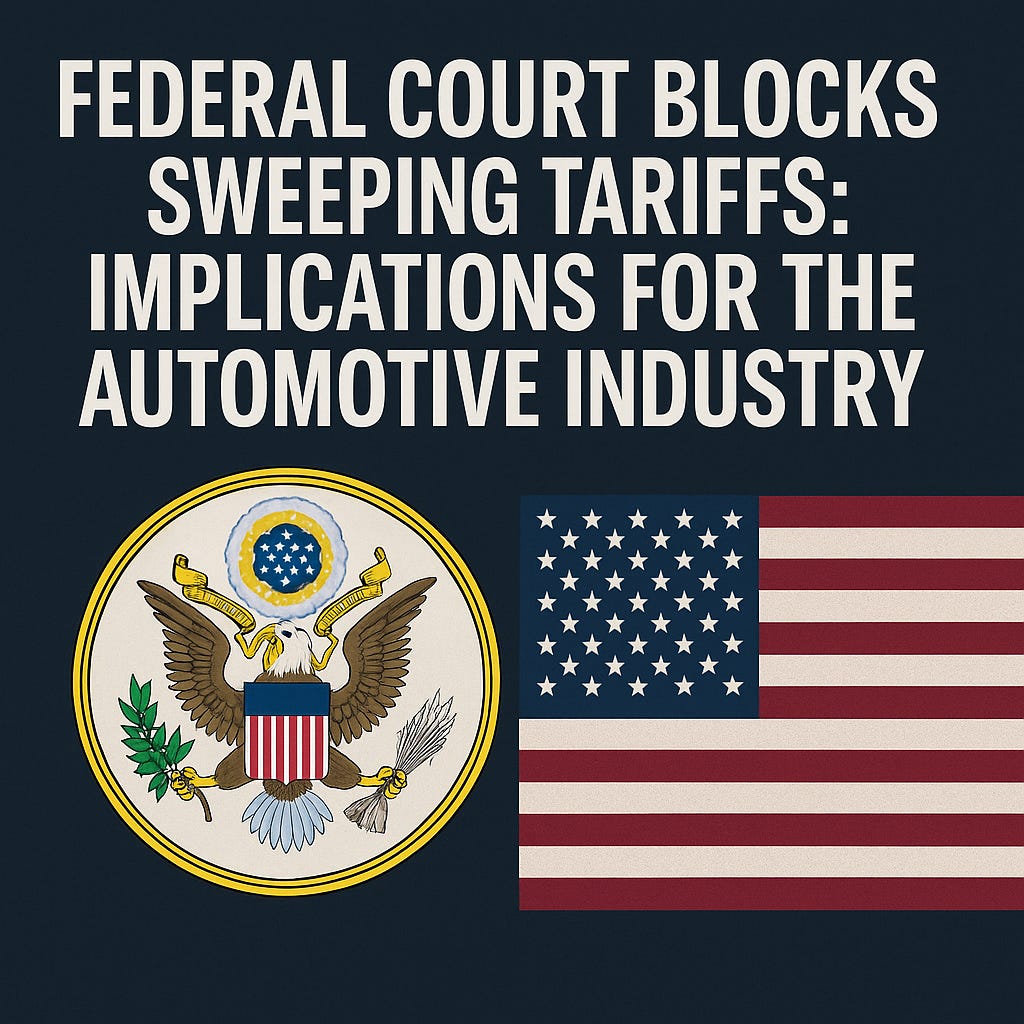Federal Court Blocks Sweeping Tariffs: Implications for the Automotive Industry
Implications for Automotive Manufacturers
Federal Court Blocks Sweeping Tariffs: Implications for the Automotive Industry
By Automotive Risk
On May 28, 2025, the U.S. Court of International Trade ruled that President Donald Trump's broad "Liberation Day" tariffs, imposed under the International Emergency Economic Powers Act (IEEPA), exceeded presidential authority and were therefore unlawful. This decision has significant ramifications for the automotive industry, affecting both domestic and international manufacturers.
Understanding the Ruling
The court's decision centered on the use of the IEEPA, a law granting the president certain powers during national emergencies. The court found that the administration's broad application of tariffs under this act was unlawful, stating that the IEEPA does not authorize such sweeping trade measures. However, tariffs imposed under Section 232 of the Trade Expansion Act of 1962, which pertain to national security concerns, remain unaffected.
Implications for Automotive Manufacturers
Domestic Brands
Tesla (TSLA): While Tesla primarily manufactures vehicles domestically, the company relies on a global supply chain for components. The continuation of Section 232 tariffs on imported auto parts and metals could increase production costs.
Ford (F) and General Motors (GM): Both companies have international supply chains and manufacturing operations. The upheld Section 232 tariffs may lead to increased costs for imported components, potentially affecting vehicle pricing and profit margins.
Stellantis (STLA): With significant manufacturing in both the U.S. and abroad, Stellantis faces similar challenges. The company may need to adjust its supply chain strategies to mitigate the impact of sustained tariffs.
International Brands
Toyota (TM) and Honda (HMC): Japanese automakers with substantial U.S. manufacturing presence may experience increased costs for imported parts due to the continued Section 232 tariffs. However, the blocking of the broader IEEPA tariffs may alleviate some pressure.
Volkswagen, BMW, and Mercedes-Benz: German manufacturers with U.S. operations may benefit from the court's decision to block the broader tariffs, potentially reducing costs for imported vehicles and components. Nonetheless, Section 232 tariffs on steel, aluminum, and auto parts remain a concern.
Hyundai and Kia: South Korean automakers may see relief from the blocked IEEPA tariffs, but the ongoing Section 232 tariffs could still impact their U.S. operations, particularly concerning imported materials.
Next Steps and Considerations
The Trump administration has filed an appeal against the court's decision, and the case may eventually reach the Supreme Court. In the interim, the administration may explore alternative legal avenues to impose tariffs, such as Section 122 of the Trade Act of 1974, which allows for temporary tariffs under specific conditions.
Automotive manufacturers should monitor the legal developments closely and assess their supply chains for vulnerabilities related to tariffs. Diversifying suppliers and increasing domestic production of critical components may be strategic moves to mitigate potential risks.
What Happens Next: The Trump Appeal
After the U.S. Court of International Trade ruled that President Trump’s sweeping “Liberation Day” tariffs exceeded executive authority under the International Emergency Economic Powers Act (IEEPA), a federal appeals court quickly reinstated the tariffs temporarily—pending further review.
The next key moment arrives in early June, when both sides are scheduled to submit final arguments. The Trump administration has also signaled it may seek emergency relief from the Supreme Court if the appeal doesn’t go its way.
Legal experts suggest that while the appeals court may delay enforcement, the Supreme Court could ultimately side with limiting the use of IEEPA for tariff power, since the Constitution places tariff authority primarily with Congress—not the executive branch.
Bottom line: the legal fight is far from over, but the foundation of executive-imposed trade tariffs is on increasingly shaky ground. And the auto industry should be preparing now for either outcome.




